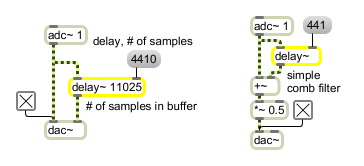Examples

Delay signal for a specific number of samples for echo or filtering effects
Delay line specified in samples or Max tempo-relative time format
| Name | Type | Opt | Description |
|---|---|---|---|
| maximum-delay-memory (samples (int)) and initial-delay-time (samples (int)) | list | opt | The first argument sets the maximum delay in samples. This determines the amount of memory allocated for the delay line (the default value is 512 samples). The second argument sets the initial delay time. The default value is 0 (samples). The time interval can be either a number which specifies time in milliseconds (e.g. delay~ 44100 200) or a notevalue (e.g. delay~ 2000 2n). Note: While the delay~ object lets you specify time in any of Max's standard time formats, the attribute argument should be used when specifying time in any other time unit besides milliseconds or notevalues (e.g. ). If notevalue, ticks, or bars.beats.units are specified for the delay interval, the object will not operate unless the transport is running. |
| int | delay-time (samples) [int] |
In right inlet: The delay time in samples. The delay time cannot be less than 0 (no delay) nor can it be greater than the maximum delay time set by the argument to delay~. |
| float | delay-time (samples) [float] |
Converted to . |
| list | time/transport-settings [list] |
Performs the same function as . |
| anything | time/transport-settings [list] |
In right inlet: A list may be used to specify time in one of the Max time formats. |
| clear | Clears the object's sample memory. | |
| maxsize | maximum-delay-memory (samples) [int] |
The word followed by a number designates that number as the amount of memory allocated for the delay line (in samples). The default value is 512. |
| ramp | ramp-time (milliseconds) [float] |
Sets the time, in milliseconds, taken to ramp to a new delay time. |
| signal | In left inlet: The signal to be delayed. |
| Name | Type | g/s | Description |
|---|---|---|---|
| delay | atom | Sets the delay time for the object. Delay time can be specified in any of the time formats used in Max. |
